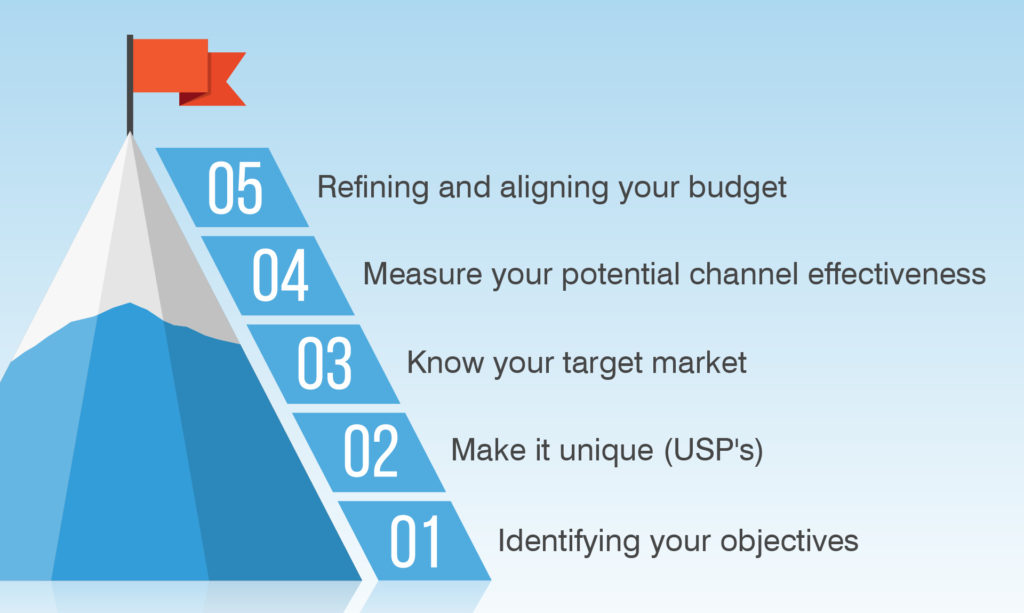5 top tips for building an effective marketing strategy.
JUNE 28, 2019
Whether you are starting from scratch or refining your existing marketing strategy for your business, it’s important to ensure that it’s firmly aligned to your goals and the direction that you want to take your business in.
Planning takes time, something which is often difficult to set aside when you are mid promotion, but a marketing strategy can’t be developed and delivered overnight, as there are so many strings to its bow – all of which need to be carefully considered alongside your business strategy. But, if you focus on these top five elements as a starting point, you can flesh it out further down the line.

To help you get started and to ensure your marketing strategy is fit for your business’s purpose, here are our 5 top tips to consider when writing it.
1. Identify your objectives
Having clear business goals will create the start point for any marketing strategy. If you’re an existing business you will need to establish which areas you need to improve on and move into, but for a new business this is the time to identify where you want to be and how you want to get there.
2. Make it unique (USP’s)
Simple marketing methods to help with identifying your goals include: a SWOT analysis (strengths, weaknesses, opportunities and threats), benchmarking against similar businesses in your industry and market research to identify customer needs and market trends. All of these methods will assist in identifying SMART (Specific, Measurable, Attainable, Relevant, Timely) objectives which you should base your marketing strategy around.
A USP (unique selling proposition) is something which defines your business’s position in the market place. It enables you to stand apart from competitors and focuses your energy on creating opportunities which cater to your market audiences.
A USP can define your business and also serves an important role internally, as it forces you to consider your company’s mission and its reason for being. You will, as a business owner, need to consider and communicate as part of your strategy what the business is for, what drives you to offer the services or products that you offer and how you want to make a unique impact, and a USP can help you deliver that.
3. Know your target market
Identifying your target market is a vital part of your marketing strategy, as you won’t be able to afford or have the time to target everyone. Targeting a specific market doesn’t mean that you are excluding people that don’t meet your market criteria, it means that you are focusing your spend on the most likely audience that will buy your product or service. This is a much more affordable, efficient and effective way to reach potential customers.
When refining your target market you should look at your current customer base (if you are an existing business), keep up to date on your competitors and what they are offering, be critical of your product and service and how it is performing and choose specific demographics to target. All of these considerations will help you to identify which media and marketing channels you should use in your marketing plan to reach them.
4. Measure your potential channel effectiveness
When it comes to measuring your channel effectiveness there are so many ways in which this can be done, but as a starting point salesfusion.com recommend that the channels you use as part of your marketing plan should aim to deliver towards the following five metrics;
- Marketing contribution to revenue
- Pipeline growth
- Conversion rates
- Cost per lead
- Brand awareness
Understanding the marketing channels effectiveness as part of your strategy will help deliver your business goals. There is of course very little point in promoting through a channel which your target market won’t engage with.
5. Refining and aligning your budget
Marketing is a fundamental ingredient for growing your business, but many companies fail in their strategy because they don’t allocate enough resource or budget to deliver their goals.
There are many ways in which you can identify the right marketing budget for your business, but all are ultimately based on data and insight into the market situation, competitor analysis and the viability and demand for your product or service.
Budgets should be allocated proportionately but be prepared to refine and align these depending on the market position at the time of implementation.
So, remember a marketing strategy isn’t a fixed document, it should evolve alongside your business to keep things moving in the right direction, based on the market and economic trends which are occurring around you.
If you’d like assistance with developing your marketing strategy for your business, get in touch with one of our marketing account managers– we’d be more than happy to help.

Can we help you with a project?

 © 2025 Mzuri Design Limited. Registered in England and Wales. Company No. 08451702 |
© 2025 Mzuri Design Limited. Registered in England and Wales. Company No. 08451702 |